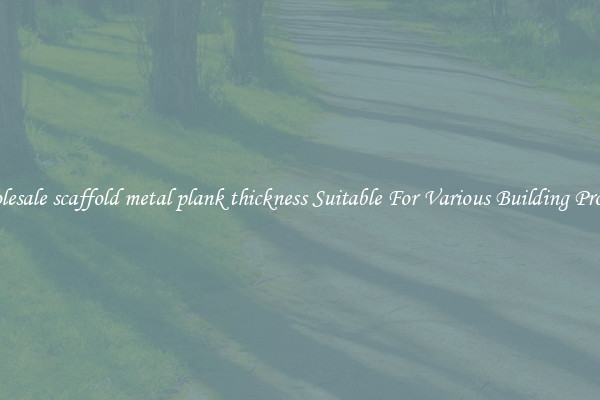Wholesale scaffold metal plank thickness Suitable For Various Building Projects
When it comes to construction projects, scaffold platforms play a crucial role in ensuring worker safety and providing a stable working surface. Scaffold metal planks, in particular, are widely used for their durability and strength. However, the thickness of these metal planks can vary depending on the specific project requirements.

In wholesale scaffold supply, metal planks are available in different thicknesses to cater to various building projects. The suitable thickness of scaffold metal planks generally depends on the anticipated load capacity, span length, and safety regulations established by national standards.
For light-duty applications such as painting, maintenance work, or simple repairs, scaffold metal planks with a thickness of 1.2mm to 1.5mm are commonly used. These planks provide sufficient rigidity and can easily support the weight of workers and light tools.
On the other hand, for heavier-duty projects such as construction, renovation, or industrial maintenance, scaffold metal planks with a thickness of 1.5mm to 2.0mm are preferred. These thicker planks offer increased strength and stability, making them suitable for higher loads and longer spans.
In addition to thickness, the width and length of scaffold metal planks also contribute to their load-bearing capacity. Wider planks accommodate a larger working space and distribute the load more evenly. Standard widths range from 230mm to 600mm, with wider options available for specific requirements.
The length of the metal planks varies to match the desired span and can be customized according to the project needs. Longer planks reduce the number of supporting elements needed, providing a more cost-effective solution.
When selecting the appropriate thickness of scaffold metal planks, it is crucial to adhere to safety standards and regulations. Local building codes and guidelines set by relevant authorities should be followed to ensure the durability and stability of the scaffold platform.
A detailed engineering assessment should also be conducted to determine the load capacity requirements for the specific project. Factors such as anticipated loads, frequency of use, and the number of workers should be taken into account to determine the right thickness and span length.
In conclusion, scaffold metal plank thickness plays a significant role in determining their suitability for various building projects. Light-duty applications typically require planks with a thickness of 1.2mm to 1.5mm, while heavier-duty projects demand planks with a thickness of 1.5mm to 2.0mm. Compliance with safety standards and conducting engineering assessments are essential to ensure the proper selection of scaffold metal planks for construction sites. By choosing the right thickness, width, and length, construction workers can ensure a secure and stable working environment for everyone involved in the project.

View details

View details

View details

View details








